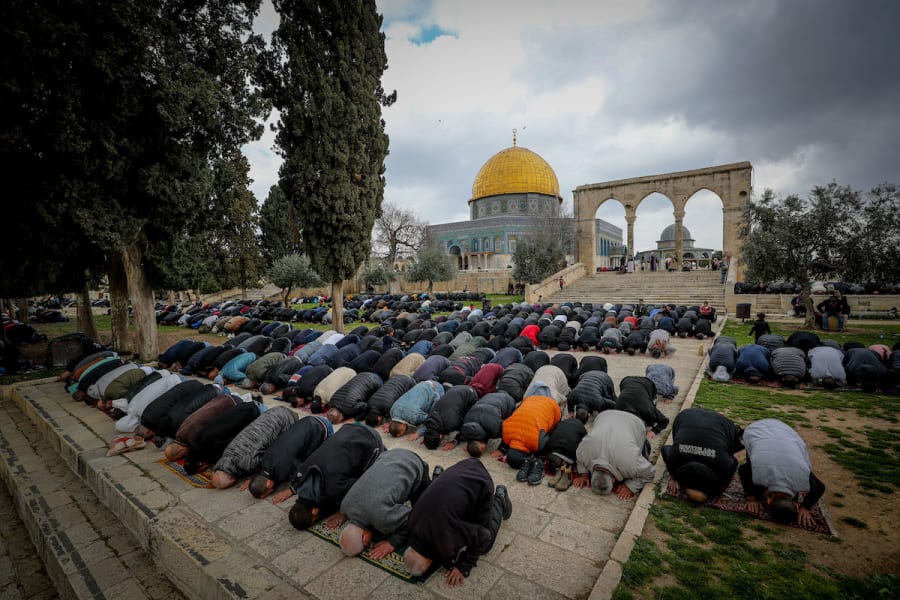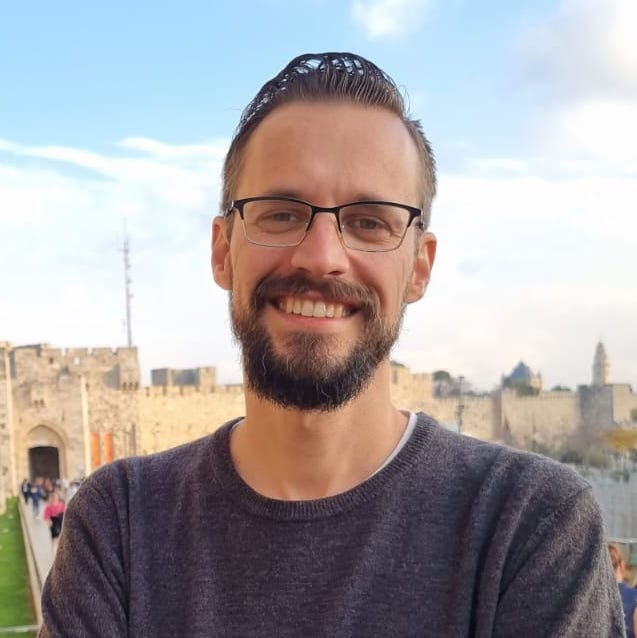How “holy” is Jerusalem…really? Judaism, Christianity and Islam each have their claim (Part 3)
In this final, part three of the series, we will explore Jerusalem as the Muslim Holy City

We often hear about Jerusalem as “The Holy City” and that it’s holy for three major world religions; Judaism, Christianity, and Islam. But how true is that statement? Is it equally holy in all three religions, or do some of these religions see it as more holy than the others do?
Since each one of these religions has ruled over Jerusalem at different points in history, we can look at that, and get some clues as to how they see Jerusalem.
We are covering one of the three religions in each of these articles, and in this, part three, we will look at the Muslim claims, and rule, of Jerusalem.
Saying that Judaism was first is only partly true. The Biblical faith in the God of Israel and the temple service of King Solomon was first – and all these three religions claim ownership of the Old Testament, Solomon’s temple, and the prophets. It wouldn’t be wrong to call this original faith Judaism, but both Christians and Muslims would argue whether today’s Rabbinic version of Judaism is the true heir of that faith.
In previous articles, we covered the Jewish and Christian narratives. Islam arrives on the stage in the seventh century, claiming to be the original faith in the God of Israel. They claim ownership of all the prophets of the Old Testament and Jesus, with Muhammed being the last prophet. The discrepancies between the Bible and the Quran are explained by the unfounded claim that the Bible “was tampered with” and if we had “the original,” all the teachings of Islam would check out.
Muhammed learned a lot from Jewish and Christian mentors and teachers, but he got a lot of things wrong, and big parts of the Quran are pure misunderstandings of the Bible. The many historical inaccuracies in the Quran are so obvious that Islamic scholars spend a lot of time making up excuses for them.
But one of the things he learns is that Jerusalem is holy to this one and only God who he wants the Arabs to serve, and so he originally suggests that Jerusalem should be in the direction of where Muslims turn when they pray. He eventually changed this to Mecca – or Allah tells him to, according to sura 2:142-151 – but Jerusalem keeps its central place in Muslim tradition, partly because it was on that Temple Mount that Abraham almost sacrificed Ishmael. (To Muslims, it obviously could not have been Isaac, because that’s a “Jewish conspiracy” and rewriting of history).
The Quran says that Muhammed was supernaturally transported by the miraculous horse alBuraq from Mecca to “a faraway place” – al-Aqsa in Arabic – where he prayed and went up to visit heaven (sura 17:1). Muslim tradition renders this place as being in Jerusalem, right on the Temple Mount. Islam, therefore, now has two reasons to see the Temple Mount in Jerusalem as holy: The sacrifice of Ishmael and the heavenly trip of Muhammed. Although it’s very possible that Muslim invaders of Jerusalem made this connection in order to make Jerusalem holy to the Muslims.
The Christians didn’t see the Temple Mount as holy. The temple and its services belonged to the Old Covenant, and they moved all their religious energy to Golgotha and the Holy Sepulchre. The Muslims, on the other hand, basically copied straight from the Jews regarding the holiness of the Temple Mount and then conquered it in 638 A.D.
Jerusalem was now part of the Umayyad Caliphate, ruled by caliph Umar Ibn al-Khattab, Muhammed’s father-in-law. Muhammed, himself, had died only six years before Jerusalem was captured.
With the history of David and Solomon in the back of their minds, the Muslims allowed Jews back into the city and announced: “Great News! We believe in the God of Israel, too, just like you. He has sent a new prophet, Muhammed, and now we will rebuild the temple! Only we will call it a mosque and we won’t follow the sacrifices of the Torah, because God has told Muhammed about these five prayers we are supposed to do instead.” (paraphrase is mine). At the same time, they also assure the Christians that their places of worship would not be touched and that the Christian population would be protected.
On the very spot where the Holy of Holiest was, they built the Dome of the Rock. Legend has it that a Jewish convert to Islam gave them the advice to build the Al-Aqsa Mosque in the northern edge of the Temple Mount, so that when the Muslims pray to Mecca, they will also turn to the Dome. But caliph Umar Ibn al-Khattab refused, and instead built the Al-Aqsa Mosque on the southern edge, so that Muslims will turn their back to the Holy of Holiest when they face Mecca. This was apparently a way to emphasize that Islam was the true faith and Mecca was the correct direction of prayer.
With Muslims, just as with Christians, we see the same pattern. Jerusalem was holy as a place of pilgrimage, not as a capital or commercial center. Jerusalem might have been holy to them, but they still established the new city Ramle to be their regional capital, and the whole area was ruled from Damascus, the Umayyad’s capital.
Jerusalem stayed under the Muslim rule under the subsequent changes. From 750 A.D., the city was under the Abbasid Caliphate ruling from Baghdad, and then from the year 979 A.D., the Fatimid Caliphate of Cairo, conquered Jerusalem from the Abbasids. A century later, the Seljuk Turks conquered Jerusalem in 1073.
The Seljuk Sultanate threatened the Christian populations and the pilgrimages, triggering the crusades who arrived from Europe and massacred all the Jewish and Muslim inhabitants of Jerusalem in 1099 A.D., turning the Al-Aqsa Mosque into a church. In 1187, Salah el-Din conquered Jerusalem and erased all traces of Christian worship on the Temple Mount, while still allowing the Christians in the Church of the Holy Sepulchre.
From 1260 A.D. until 1517 A.D., Jerusalem was ruled by the Mamluks, a non-Arab Muslim people descended from former slaves of Muslims. This era was filled with wars against crusaders and Mongols, earthquakes and the black plague. They didn’t even rebuild Jerusalem’s walls out of fear that the walls would benefit the crusaders if they would ever reconquer Jerusalem.
Again, Jerusalem was holy and a site of pilgrimage – but never a capital. The Mamluks ruled from Cairo, and the regional capital was still Ramle. Jerusalem’s status became that of a village and, according to a visiting rabbi in 1267, the city had about 2,000 inhabitants, with a mere two Jewish families and around 300 Christians.
From 1517 until 1917, the Ottoman Empire ruled Jerusalem. Again, it was a neglected corner of their empire, which was ruled by Constantinople, or Istanbul. It’s true that Sultan Suleiman rebuilt the city walls – those are the walls standing today – between 1537 to 1541, but that was part of his general grandeur building projects.
It was also during his reign that the Temple Wall became the Wailing Wall. For centuries, Jews had been banned from the Temple Mount, but because they were allowed outside, they would pray against the wall, the only remnant of the temple.
Suleiman was annoyed by the Jews praying there and assigned them a specific place on the western side, announcing that this is the place for Jews to pray. Since then, this Western Wall has been the central and most holy place for Judaism – and it was established by a Muslim.
From this point, the three religions that see Jerusalem as holy have three separate focal points – the Western Wall for Jews, The Holy Sepulchre for Christians and the Temple Mount for Muslims, which they call Al-Haram Al-Sharif, the Noble Sanctuary.
From the mid-1800s, the Jews became the majority of Jerusalem and, as new neighborhoods were built outside the city walls, many of them were Jewish. Zionist immigration waves began arriving from the 1880s, doubling and tripling the Jewish population. When the British arrived in 1917, they ended a 730-year rule of Islam over Jerusalem, representing the first Christian rulers of Jerusalem since the crusaders.
In 1948, the British left Jerusalem without implementing the United Nations' decision on division, leaving the region spinning into a civil war, today known as Israel’s War of Independence. During the course of the war, Jerusalem was divided and the eastern half fell under Jordanian rule, including all the holy places of all three religions, while Israel kept the western part with the new neighborhoods.
In the Old City, the Jewish holy places were desecrated, synagogues were demolished, Jewish inhabitants were expelled, and the Western Wall became a garbage dump. For the first time in many centuries, Jews were again banned from visiting their holy places. Once the eastern part of the city fell into Israel’s hands in the Six-day War of 1967, Jerusalem was once again, for the first time since 70 A.D., the capital of the Jewish people. The houses next to the Western Wall were demolished, making the Western Wall plaza large and accessible, and the synagogues that had been destroyed by the Jordanians were rebuilt.
Unlike the Christians, where there is an internal debate on the issue, Muslims are all replacement theologians by definition. They believe they serve the original one true God of Abraham, but the Quran also says clearly that the Jews are no longer God’s chosen people. They can be benevolent and tolerant towards Jews and Christians, and have often been so throughout history, but that does not mean they are ready to accept living under Jewish sovereignty.
In summary, for Muslims, Jerusalem is the third holiest city and the place where Muhammed prayed and went to heaven. For Christians, it’s a focal point of the Bible and the place where Jesus was crucified and resurrected.
But for Jews, Jerusalem is and has always been so much more than that. It’s not just about Bible stories. It’s our capital, our history and our future.
Since 70 A.D., the Jews have said “Next Year in Jerusalem” twice every year, on Passover and Yom Kippur. For the many centuries that Jerusalem was under Gentile rule, Jews continued praying and wishing for Jerusalem to become our capital once again. When we look at how the Gentiles have ruled it, and then not cared about it, and kept it as a side-note or neglected corner of their empire, it’s both insulting and frustrating. It’s like when a bully steals your favorite toy, only to neglect it and not care about it, just out of spite.
Now that it is ours again, it’s not just a holy city and not just a spot for pilgrimage. It is the capital. And it’s flourishing. With almost a million inhabitants, which is about 10% of all Israelis, it’s Israel’s largest city and its municipal borders take up 48.323 square miles. For comparison, the walls of the Old City encompass an area of 0.35 square miles. The original Jerusalem of King David was 0.02 square miles.
One could argue that Palestinians see Jerusalem as their capital, not just as a holy pilgrimage site, and this is true. Even under Jordanian rule, they were bitter about the Jordanians ruling over what they felt should be their capital. However, this is not a claim that has any religious basis but, rather, a secular and nationalistic viewpoint. If we look through history, there is not one single time when Jerusalem has ever been the capital of a Muslim country, empire, sultanate, or caliphate.
So what can we expect for the future of Jerusalem?
One day, the Messiah will rule the world from Jerusalem. And he will not be a Christian Gentile, nor a Muslim Mahdi, but an Israelite – they will look upon him whom they have pierced, and he will rule as their brother, not as a foreign oppressor. On that day, there will no longer be any competition about who Jerusalem belongs to, but we will see how Isaiah’s prophecy is fulfilled:
“In the last days the mountain of the Lord’s temple will be established as the highest of the mountains; it will be exalted above the hills, and all nations will stream to it. Many peoples will come and say, “Come, let us go up to the mountain of the Lord, to the temple of the God of Jacob. He will teach us his ways, so that we may walk in his paths.” The law will go out from Zion, the word of the Lord from Jerusalem. He will judge between the nations and will settle disputes for many peoples. They will beat their swords into plowshares and their spears into pruning hooks. Nation will not take up sword against nation, nor will they train for war anymore.” (Isaiah 2:2-4)
What are we to do until then?
God has told us, through the prophet Isaiah – pray for Jerusalem without ceasing.
“I have posted watchmen on your walls, Jerusalem; they will never be silent day or night. You who call on the Lord, give yourselves no rest, and give him no rest till he establishes Jerusalem and makes her the praise of the earth.” (Isaiah 62:6-7).
Pray for the peace of Jerusalem. May those who love you be secure. May there be peace within your walls and security within your citadels. (Psalm 122:6-7).

Tuvia is a Jewish history nerd who lives in Jerusalem and believes in Jesus. He writes articles and stories about Jewish and Christian history. His website is www.tuviapollack.com














